You think teenagers are trouble today, you should have seen them in 1955, back when they were invented. Not that people weren’t literally teenaged before then, they were, unless they were very clever and went from age 12 to age 20 with the aid of, say, a time machine arriving from far in the future, where sentient octopi rule the globe with powers unknown to mere humans, but the actual word “teenager” and the concept it describes, that of a specific stage of growth between childhood and Little Red Riding Hood and adulthood and Robin Hood, only came into being in 1941. Or so. Possibly a little earlier. It all had to do with the freedom of the automobile—allowing kids to wander off far from home, meet girls from other towns, and impregnate them at Lookout Point—and with the invention of high school, into which kids taken from one-room schoolhouses from miles around were thrown, forming a ghastly writhing heap of surging hormones hellbent on destroying the universe.
Or so I have read.
Still, in the ‘40s we had WWII getting in the way of all the fun, plus who even bothered to have children during the Depression, you couldn’t, you were starving and living in a bowl of dust, so there simply weren’t enough of these newfangled “teenagers” to get into any trouble or worry anyone, not until the ‘50s, when, lousy with teenagers born to GI’s home for a visit during the War, high school exploded with greasy hair, lascivious skirts, awesome cars, knife fights, and gangs of dancing hoodlums singing songs in the streets. They were a generation of troubled, angry kids. Their fathers either died in the war or came back “shell-shocked,” a condition nobody cared or talked about or took even remotely seriously. Troubled by horrific waking dreams of severed limbs and exploding heads? Suck it up, pal! Hold it inside, and if it has to come out somehow, why not beat your wife and terrorize your children? They’ll respect you all the more. Well done! Now get back to work selling vacuum cleaners.
Where was I? So there’s a shit-ton of teenagers, and a term to describe them, there’s the coolest cars of all time, drive-in movies and drive-in eats, and, as of the early ‘50s (or so, depending on who you believe), there’s rock and roll, the most dangerous music ever invented by Satan and his dark minions.
The result of this terrifying historical mixture? Melodrama! 1955 saw the release of two classics of teenage melodramas: Blackboard Jungle and Rebel Without A Cause, the latter of which, having last seen it years ago, I can’t say anything coherent about, but if you want to talk melodrama, good grief, this movie is dripping with it, it’s insane, it’s got then-recently-deceased James Dean moping around, smoking, and just generally smoldering irresistably, his dad, Mr. Magoo, failing to understand him, Natalie Wood being hot, and everyone else, including an outrageously young and dashing Dennis Hopper, wanting to drive fast and knife one another and go out in a blaze of glory.
Blackboard Jungle I watched for the first time ever last night. It came out a few months prior to Rebel Without A Cause, and when it did, it resulted in teenagers going completely batshit insane. There was dancing in theaters, the trashing of theaters, riots, gang violence, the works, and I’m not even making this up. It was briefly banned in England. It caused a colossal societal shitstorm. Famously, it opens with the Bill Haley And His Comets song, “Rock Around The Clock,” the first time a rock and roll song was used in a movie, which despite being previously released as a b-side, shot to number one on the charts and stayed there for weeks. The kids went loopidy-doo for this flick, as they said back then. Or as I would like to imagine they did.
And this movie? Go figure. It’s a slow, earnest, at times unbearably goofy melodrama of the most melodramatic kind. I wanted to like it. I gave it everything I had to give. But it almost killed me. How did kids go nuts for this back in the day? They went nuts for it because movies for or about teenagers were thin on the ground (yet on their way to becoming a huge trend). It was like finding a tiny pool of stagnant, brown, bug-infested water in the middle of the desert, and you’re dying of thirst, so not only do you drink it, but it’s the best water you’ve ever tasted in your life, it’s enough to send you singing and dancing into the streets, which is exactly what you do, probably gyrating your hips with wild sexual abandon and, aided by your equally no-longer-thirsty friends, tearing to shreds the very fabric of decent society.
Have I gone off track again? The movie stars Glenn Ford, who appeared in 109 movies (!), including Gilda, The Big Heat, 3:10 To Yuma, and Superman, as new English teacher Mr. Dadier, a name just exactly weird enough to be pronounced Daddy-O by his troublesome class of juvenile monsters. The prime delinquent is Artie West, played by Vic Morrow in his first ever screen appearance. Poor, dead Vic Morrow, decapitated by a helicopter on the set of Twilight Zone: The Movie back in ‘82. What, I was 11 at the time, it’s the sort of detail one remembers.
The other seeming tough guy is Gregory Miller, played by a very young Sidney Poitier. Miller’s not really so bad, though. He plays piano, sings, and works at an auto shop. His real problem? Teachers always give up on the kids. But not Mr. Dadier! Sure, he thinks about quitting, most seriously after his wife, driven to nervous distraction by a series of anonymous letters and phone calls claiming that Mr. Dadier is having an affair with another teacher, goes into early labor and delivers their baby boy almost, but not quite, to his early death. Who wrote those letters and made those phone calls? That damn Artie West.
Anyway, I might have gotten ahead of myself. Or maybe not? The high school is presented as a kind of jail where the teachers are lucky not to be murdered. Another new teacher, Miss Hayes, is attacked and almost raped in the library before Mr. Dadier saves her, chasing her attacker through a window. These kids mean business.
Dadier’s wife, Anne, is played by Anne Francis, who I didn’t recognize, so distracted was I by her enormous forehead. Has Anne Francis always had such a vast piece of real estate up there? I swear you could park an aircraft carrier on it. Maybe her hairstyle in the movie accentuates it? I don’t remember all of that forehead from Forbidden Planet. She exists primarily to look pouty and, when called for as above, suffer. Alas, there are no talking robots in the movie for her to drink whiskey with.
In another scene, Dadier and the nebbish new math teacher, after getting drunk at a bar, are attacked in an alley by seven of their students, who beat the tar out of them. But does Dadier crack? Heck no! He becomes even more resolved to teach.
As for that other beaten teacher? Inexplicably, he brings his highly valuable collection of rare jazz records to class. You know, to sooth the beasts with the soulful cornet of Bix Beiderbecke (who when I first heard his name spoken aloud in a college jazz class (that’s right, and it was awesome), I thought his name was Big Spider Beck, which how great a name is that?), only as you may have already guessed, the kids don’t go for jazz. They smash his records to pieces in what for me was the saddest moment of the movie. You don’t destroy music, you punks!
Blackboard Jungle was written and directed by Richard Brooks, who made, among quite a few other movies (mainly in the ‘50s and ‘60s), In Cold Blood and Elmer Gantry, two I love. Brooks is a strong writer, and Blackboard Jungle is by no means bad in a way suggestive of poor writing or directing or acting. I mean maybe it’s not even “bad” at all. It’s dated, is the problem. It deals with issues in a way that while interesting historically—look how people thought and acted in ’55!—fails to connect at all today, save in its most basic dramatic aspects—he’s a teacher who just wants these kids to learn, and they’re kids who just need a strong, understanding hand to guide them!
It’s the template for “good teacher faces impossible odds at tough school, finally gets through to kids with clever ploy that touches their enfeebled little hearts,” like Edward James Olmos in Stand And Deliver, or Nick Nolte in Teachers, or Robin Williams in Dead Poets Society, or Jack Black in School of Rock, or an older and wiser Sidney Poitier in To Sir, With Love (I smell a double feature), or Mark Harmon in Summer School, or Goldie Hawn in Wildcats. Okay, maybe not that last one. Also not like Ryan Gosling in Half Nelson, because, technically, to be considered for this category the teacher in question can’t be a crack addict. Those are the rules, people. I didn’t make them.
How does Dadier finally get through to his kids? He shows them a jaunty cartoon version of Jack And The Beanstalk, then asks the kids to really think about it. They conclude that Jack is a thief and a liar and a murderer, yet still gets the golden egg-laying hen and the princess in the end. This, they feel, is unfair. Well done, childrens—you’ve been educated.
Wait, not yet. Following the cartoon, no good rotten punk Artie West pulls a knife on Dadier. He slashes Dadier’s hand. But when Artie tells the other kids to attack, nobody complies. He’s alone now. The kids love their teacher. Dadier knocks the knife away, and brings Artie—to the principal’s office! A brutal denouement if ever there was one.
Aside from historical interest, of which I understand you may have none, I advise skipping Blackboard Jungle. If you’re in the mood for an outrageously melodramatic ’55 movie about teenage angst, I’d stick to Rebel Without A Cause.

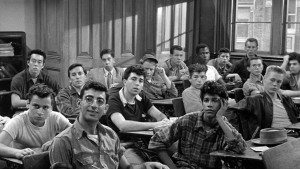
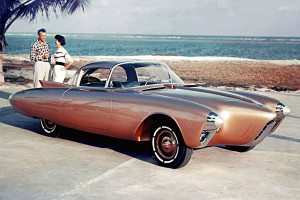
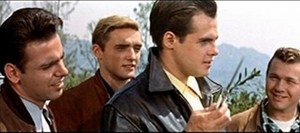
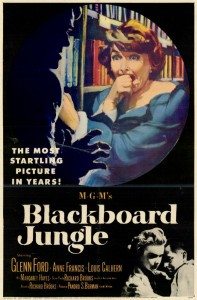
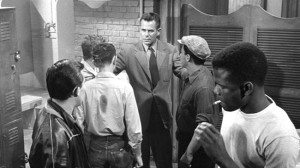
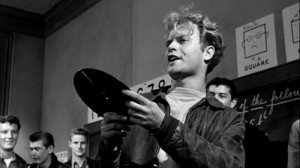
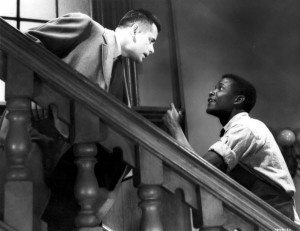
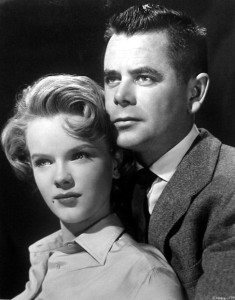
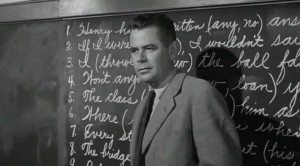
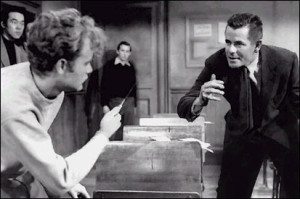
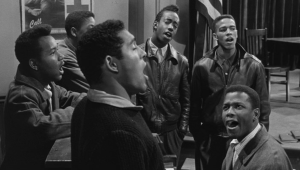
In reference to Rebel without a Cause, I just want to say: Sal Mineo.
Mostly because I like saying Sal Mineo.
Introducing…. Sal Mineo and Big Spider Becks! But first: Dik Dik!